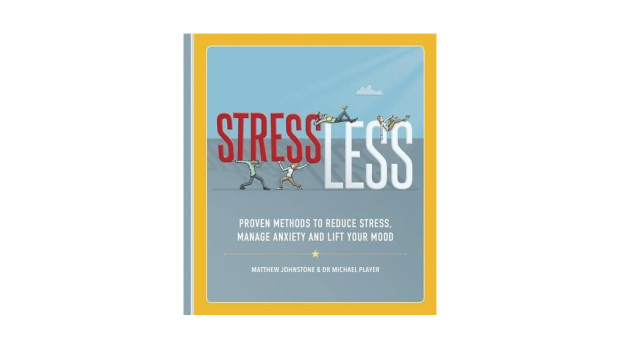
StressLess
by Matthew Johnstone and Michael Player
Pan Macmillan
As a psychology graduate and resident stress-head, I was definitely looking forward to reviewing this book. The combination of Michael Player’s Clinical Psychology expertise, alongside Matthew Johnstone’s illustration prowess, seemed like a fail-safe for commercial success. Indeed, StressLess, published by Pan Macmillan, contains many of the elements I was looking for; exercises to help individuals find triggers of their anxiety, step-by-step guides to relaxation and mindfulness techniques, explanations of the psychophysiological reactions of stress translated into layman’s terms all in one visually appealing publication.
However, this text came across as though it was exclusively for middle-aged corporate “go-getters,” and irrelevant to other populations. It reads like a guidance podcast made by a life coach that you met at your middle-aged cousin’s dinner party. It is unclear who predominantly writes this text, as Johnstone and Player’s writing favours corporate language and anecdotes and often over-explains concepts. The term, “scientifically proven,” is used innumerable times in this book, when anyone with a science degree would argue that trends like these cannot be “proven,” only supported by evidence.
This unfortunately perpetuates century-old misconceptions regarding scientific practice and evidence-based treatment. This favouritism for corporate appeal is additionally emphasised by Johnstone’s accompanying illustrations, which provides great aesthetic appeal but often overpowers the information, in danger of trivialising the material.
Almost all of the anecdotes are based on examples of individuals who are over-worked within the corporate sector, or from the authors’ own experience in working in advertising and private business. These experiences can hardly be considered wide-ranging but are presented in a recurring page entitled “Short Stress Lessons from Life” where they are presented as fables with a concrete moral. This narrows the target audience to a very specific demographic (perhaps intentionally), potentially alienating individuals who may not fit into this specific box.
Despite its downfalls, this book does provide really strong and helpful information. It follows a logical format (albeit corporate, as chapter titles are branded with “Less” – e.g. MindLess, FearLess and my least favourite, WeightLess), first teaching individuals the bases of stress to better understand the effectiveness of various techniques and exercises. It prompts readers to jot down their responses to various exercises in a notebook, so the reader ends up with a compendium of beliefs, triggers and self-care methods, amongst other things, unique to the individual.
Johnstone utilises exercises from Cognitive Behavioural Therapy, Dialectical Behavioural Therapy, Act and Commitment Therapy and Mindfulness, encouraging thoughtful self-evaluation. StressLess eventually invites the reader to utilise this information to build personalised “Wellness Plans” and teaches techniques to prevent stress relapses.
This book is not perfect. It appeals to a very specific demographic, and contains many images inspired by advertising and marketing techniques that, as advertising does, often overpowers the information. However, if the reader can ignore these, StressLess is a great manual to help control one’s stress and anxiety levels.
CALLISTA GOH